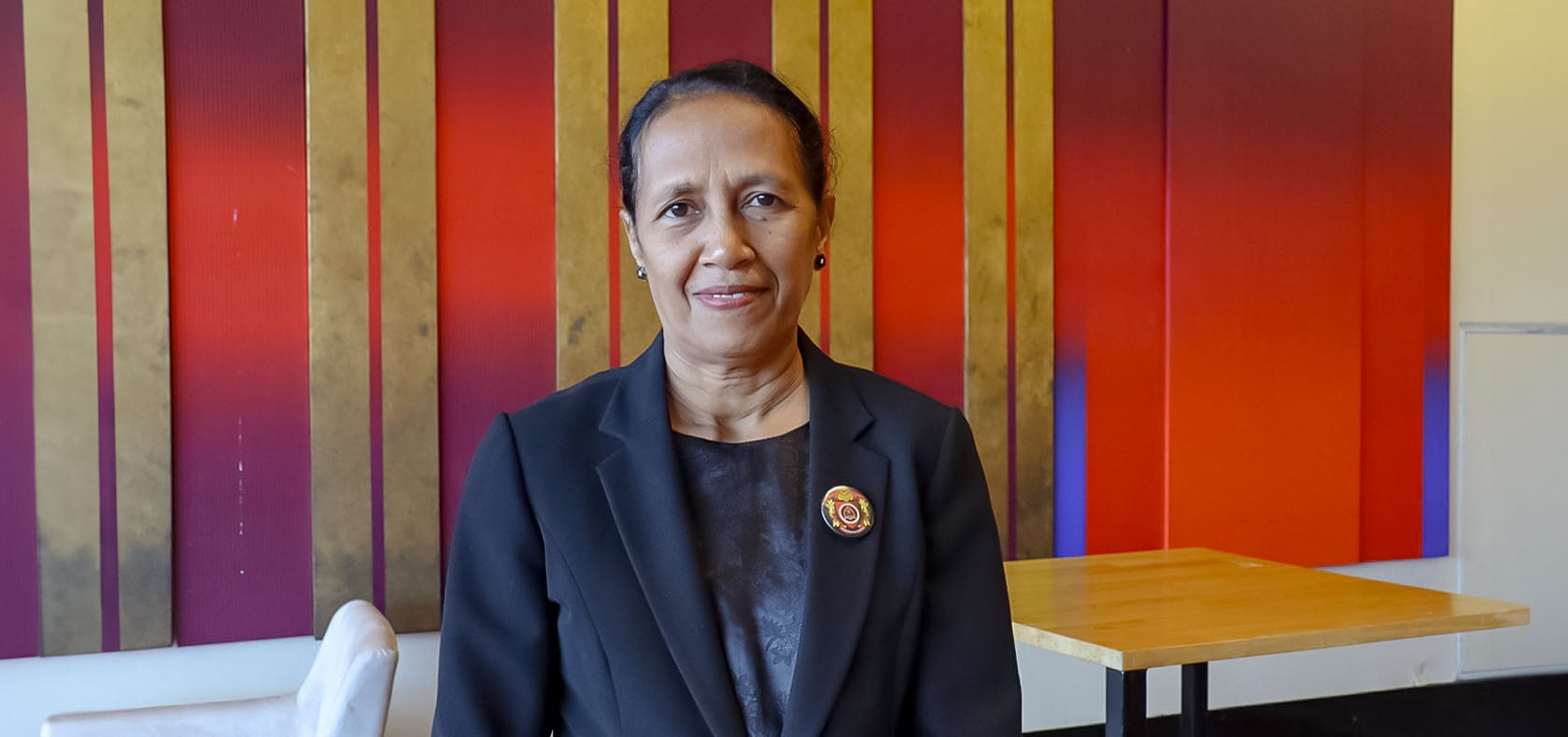Take Five: “Feto sira hahú komprende katak sira nia papél la'ós de'it ba serbisu uma-laran nian”
Data: 28 Juñu 2024
Entrevistadór sira: Yoomi Jun no Jeremias Gomes

Lidia Lopes de Carvalho nu’udar Diretora ba Diresaun Nasionál Prevensaun Konflitu Komunitáriu Ministériu Interiór, Timor-Leste. Timor-Leste adopta ona Planu Asaun Nasionál daruak kona-ba feto, pás no seguransa, ba tinan 2024-2028 . UN Women agora daudaun suporta Governu Timor-Leste hodi dezenvolve no implementa ninia planu. Husi loron 24 to’o 28 fulan Juñu tinan 2024, Sra. Lopes de Carvalho partisipa iha formasaun ida kona-ba Planu Asaun Nasionalkona-ba feto, pas no seguransa, ne'ebé konjuntamente organiza husi Institutu ASEAN ba Pás no Rekonsiliasaun no UN Women iha Bangkok, Tailándia. Formasaun ne’e hetan suporta finanseiru husi Governu Kanadá, Repúblika Koreia, no Reinu Unidu nian.
Tanba saida maka importante atu involve feto iha servisu Pás no Seguransa nian iha Timor-Leste?
Solusaun ba konflitu sira tenke liu husi prosesu dame, la’os violénsia. Iha Planu Asaun Nasional dahuluk nian, ami rekruta ona mediadór na’in 40 (porsentu 47 mak feto) atu serbisu iha harii pas, hodi identifika sinál konflitu, rezolve no prevene konflitu sira. Ita tenke envolve feto barak liután tanba sira iha pasiénsia no komprende nesesidade espesífiku sira hosi komunidade no feto sira, no sira hatene oinsá atu uza aprosimasaun ida-ne’ebé empatiku no ho-laran, hodi envolve indivíduu sira no halo mediasaun ba konflitu sira.
Oinsá Planu Aaun Nasional promove ona igualdade jéneru?
Timor-Leste adopta ona tarjetu jéneru pursentu 30 iha Parlamentu Nasionál no agora ita iha feto dahuluk nu’udar Prezidente Parlamentu Nasionál. Ita mós iha Xefe Casa Sívil iha gabinete Prezidente Repúblika nian [ne’ebé mak] feto. Timor-Leste hasa’e ona númeru polísia feto no feto sira iha forsa militár, no durante ne’e promove ona empoderamentu feto no igualdade jéneru, hanesan estabelesimentu departamentu igualdade jéneru iha forsa militár no Estratéjia Jéneru dahuluk ba Polísia Nasionál iha 2018. Ita mós iha Komandante Operasaun polísia feto dahuluk iha nivel nasionál iha 2023, polísia feto dahuluk ne'ebé lidera Diresaun Jerál ba Servisu Imigrasaun nian no feto barak tán ne’ebe promove ona ba pozisaun sira foti desizaun nian iha serbisu públiku ka espasu diplomátiku sira, inklui iha misaun manutensaun Pás ONU nian. Organizasaun feto timoroan sira mós la kole luta atu hetan oportunidade barak liután ba feto sira.
Saida maka lisaun sira ne'ebé aprende ona hosi planu asaun nasionál dahuluk nian?
Feto sira hahú komprende katak sira nia papél la'ós limitadu ba deit iha serbisu uma-laran nian maibé sira iha direitu ba edukasaun, justisa atu sai na'in ba rai, katak sira bele lori kareta no halo parte iha forsa seguransa ka militár. Ita bele haree katak iha mudansa signifikativu kompara ho tempu pasadu. Feto sira bele partisipa iha nivel foti desizaun hotu-hotu no iha nivel setor hotu-hotu – iha polítika, sosiál, justisa, edukasaun, ekonomia, kultura, nst.
[Iha prosesu dezenvolve PAN 1325] ami konsulta parte nakaet oioin hanesan liña ministériu sira; veteranu sira; feto sira, inklui feto sobrevivente sira; organizasaun sosiedade sivíl sira ne’ebé servisu ho ema ho defisiénsia sira; grupu LGBTIQ+ sira; no lider konfisaun relijioza sira ho aprosimasaun partisipatoriu. Maski nune’e, ita presiza hametin liu tan sentidu na’in ba prosesu tomak, ne'ebé agora dadaun menus loos iha nivel subnasionál sira. Ita tenke asegura atu halo komunidade sente orgullu ho [planu], katak ida-ne'e hakerek hosi Timor-oan sira, no liuliu ba feto sira atu hatene sira nia papél importante tebes.
Saida maka pasu importante tuirmai atu asegura katak Pás ne’e sustentavel?
Mak liu husi eduka no forma jerasaun tuirmai nu'udar kontinuador.
Foin-sa'e sira envolve iha konflitu sira tanba falta oportunidade ba servisu, ka família labele suporta sira nia edukasaun. Sekretaria Estadu ba Formasaun Profisionál no Empregu fornese hela formasaun profisionál no asisténsia finansiamentu ki'ik ba foin-sa'e sira atu nune'e sira bele hahú sira-nia negósiu envezde [envolve] fali iha konflitu sira. Liuhusi edukasaun sívika, ita mós tenke hanorin joven sira kona-ba demokrasia, direitus umanus, étika no morál hodi promove sentidu nasionalizmu no patriotizmu ba joven sira no sosiedade en-jerál.
Saida mak dezafiu seguransa balun ne’ebé mosu iha Timor-Leste?
Vítima dezastre naturáis sira sempre feto no labarik-feto sira. Ita presiza halo buat barak liután kona-ba mitigasaun no hasa’e koñesimentu komunidade sira nian hodi hadook-an hosi área sira ne’ebé iha tendénsia ba risku. Presiza sistema alerta sedu ba dezastre naturáis sira.
Ita presiza kontinua sensibiliza ba ema sira kona-ba sinál sira ka indikasaun tráfiku umanu nian no atu iha atensaun ba risku uza no habelar narkótiku sira.
To find latest information about Women, Peace and Security agenda in ASEAN region, visit https://wps.asean.org